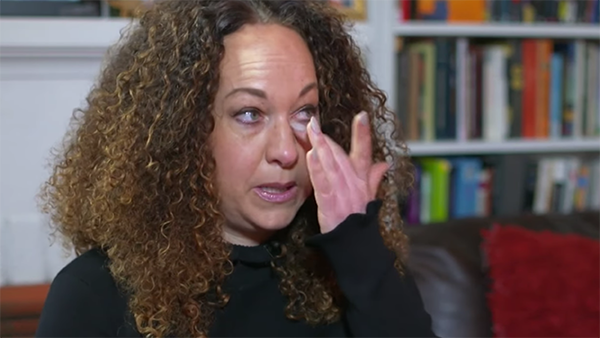When it comes to staying informed, I sometimes find it difficult to discern what is worth my time and attention. Advice to be aware of all sides in the name of “objective truth,” however, becomes a trial when the subject involves topics which are morally and culturally out of bounds. Let’s take the person formerly known as Rachel Dolezal as an example, who was revealed to be white after attempting to pass as a black woman.
According to a March article by the New York Post, the former NAACP chairperson and black studies professor at Eastern Washington University recently changed her name to Nkechi Amare Diallo – Nkechi meaning “gift of God,” or “what God has given,” in the Igbo language. Current news circulating does not acknowledge this change in moniker, in order to remain consistent with the initial coverage and it’s ongoing story, and we will continue to regard her as the woman formerly known as Dolezal.
In fact, more recently, Dolezal has opined in an interview with Salon magazine that her story is comparable to that of Caitlyn Jenner. Dolezal says, “there’s more stigma for race fluidity than gender fluidity right now, and I don’t think anybody would deny that.”
As a multi-ethnic, Latinx, queer-identified person I deny this, absolutely. For one, in referencing “gender fluidity,” she opts for a term that is less politicized, but as a so-called activist she should know that black trans women and transwomen of color are the most vulnerable members of society. This year alone, at least seven trans women have been murdered, all of them transwomen of color.
That Dolezal uses the word “stigma” is also a very telling indicator; she is speaking from her experience and the backlash her actions and words are facing. “Stigma” against transgender people is more often state sanctioned discrimination via legislation and lack of rights and resources, bullying, harassment, violence, murder and suicide. All Dolezal has to deal with is the criticism by race and gender scholars, activists and everyone in between, proving how far removed she is from the world of identity politics and the pedestal of privilege from where she projects.
If you ask me, the only thing Dolezal has in common with Jenner is that they are both white women who think they can speak for marginalized peoples, with whose real experiences they are completely out of touch.
In a tearful, March interview with BBC Newsnight, Dolezal disturbingly mirrors perspectives of children who deal with gender dysphoria or sexual questioning. She says, “I had to constantly mask and subordinate and repress part of myself to kind of, survive, socially.” She goes on to victimize herself and says she was punished for “being myself,” or “being creative or spontaneous.
“I hadn’t intentionally been doing something wrong or evil or terrible, it was just um…I had stepped out of line. I hadn’t done what a girl should do and somehow [had] been immodest or sensual or something. And I had to be punished for that because I was being raised to believe that the only goal for me in life was to get married and bear children and be a good wife and mother.”
The double standards made for women in American society are very harmful, and gendered violence is continually perpetuated because of the way women are subjugated in the family and workplace. Still, Dolezal is very clearly conflating feelings of gender dysphoria and cultural and racial appropriation. She uses blackness as a way to defy white American values and expresses it in a way that also insults and injures LGBTQ people, especially vulnerable youth who actually struggle to transition or navigate their identities for fear of being kicked out and abandoned.
Just because race has been socially constructed to benefit white men and dehumanize black and brown people does not mean that is something that can be appropriated by white saviors like Dolezal. Blackness is not a mule she can use to be a better activist and ally, and if anything, it reveals her own white guilt and self hatred.
The idea of self hatred or internalized racism among people of color who assimilate is understood as a product of racism in society. When people assimilate, when people want to be white or want to have light-skinned children, they are inadvertently agreeing that people of color are disproportionately disadvantaged.
The situation is flipped for Dolezal, on the grounds that she “stands on the black side…philosophically, politically, socially,” but she does not have lived experience to be a spokesperson for black women and communities.
There is a difference between allyship and appropriation. If Dolezal wants to continue to be an ally to black people, she needs to quit the botched box braids and perms and focus on promoting and supporting black scholars and activists who are often left unheard. These are heinous acts of victimization which she is performing, actions which mock mourning communities; transwomen who continue to be targets for brutal violence, black women who face state violence by police, young black girls who are disappearing at increasing rates in Washington, D.C.
Quite frankly, I do not believe that Dolezal deserves any of this attention, and major news sources might be benefitting her with coverage while she reaps the visibility. But she has crossed the line this time, and needs to be held accountable for her gross inconsideration and appropriation.




